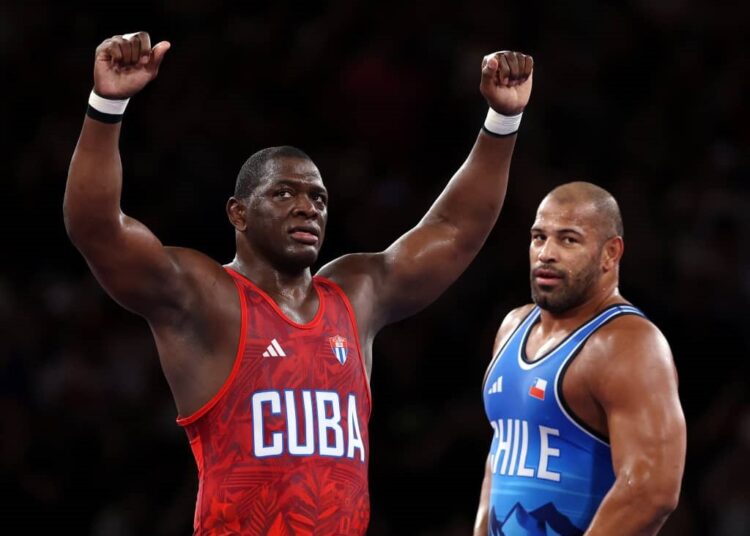The name of Yuri Evseichik is not just another one in the history of Greco-Roman wrestling. The Israeli won world bronze in 1998 and repeated the same position in the summer games of Sydney 2000, in addition to being considered one of the best gladiators of the super heavyweights in the 1990s. However, in Cuba he is not remembered for his triumphs, but for being the first obstacle in Mijaín López’s Olympic career.
As far back as August 24, 2004, Evseichik appeared dressed in red at the Ano Liosia Olympic Hall in Athens, ready to make his debut with a blow against a 22-year-old kid who arrived at Mount Olympus like a mere mortal, even though his figure seemed to be hand-sculpted and resembled that of Zeus, Poseidon or Ares.
However, it did not take long for Mikhail (as he was presented by the Greek organizers) to set off the alarms of his rivals. The rookie born in a remote town in Pinar del Río began his journey in Athens with a firm step, achieving an energetic bear hug and a couple of off-balances that disconcerted Evseichik and sent him to the showers early.
The next victim was the Turkish Yekta Yılmaz Gül, also eliminated from the map, leaving the table set, after 24 hours, to face the decisive fights. At that point, the first obstacle in the Cuban’s path was the Russian Khasan Baroev, who could never have imagined that he was about to enter the record books as the only human being to have defeated Mijaín López in the Olympic Games.
When the Pinar del Río athlete lost, one of the many Cubans who suffered was Yasmani Acosta, a promising 16-year-old wrestler who was already taking his first steps on the Matanzas mats, with hopes of one day being promoted to the national team. The athlete from Matanzas was fighting in the heavyweight division, so the clashes with Mijaín were already written in his destiny.
What Acosta never imagined ― like Baroev ― is that one of those confrontations would come exactly 20 years after Athens, at the farewell of the legendary Giant from Herradura and even perhaps his own. In all that time, the lives of these two Cubans have taken many turns: the defeat in 2004 transformed Mijaín into a competitive beast, the Caribbean reincarnation of Aleksandr Karelin, a practically invincible fighter for two decades; while Yasmani took the path of emigration and fought to become a figure in Chile, a country with no tradition whatsoever in wrestling.
Despite the distance, the two managed to stay connected in some way, deceiving the passage of time, overcoming all kinds of adversities and climbing onto the central stage of the Champ de Mars Arena to dispute the title of the Paris Olympic Games. Few sports stories must have such a perfectly crafted script…
As expected, the ending did not disappoint either. The two giants came out into the arena escorted by their trainers ― also Cubans through and through ―, walked to the mat, shook hands, hugged each other and began the dispute, the last dance.
From then on, Paris surrendered to Mijaín: “López, López, López!” chanted the crowd as the six minutes of combat until eternity vanished. And as if it were a formality, the Pinar del Río wrestler pushed, pulled, grabbed again until he achieved the same bear hug of the first Olympic day against Yuri Evseichik, turned Acosta, got a back pass, and maintained his immaculate defense. Imperial!
In the stands, legends of Cuban sport such as Javier Sotomayor or Ana Fidelia Quirot watched; in his corner, another champion was enjoying himself under the five rings like Héctor Milián; and in the grandstand, the president of the International Olympic Committee, Thomas Bach, surrendered to the best wrestler in history. Farther away, millions of souls scattered across the planet vibrated when Mijaín raised his arms with open hands; many cried when he walked to the center of the mat, unlaced his shoes, and left them there as a symbol of his farewell.
Thus was crowned a unique, unrepeatable career. The Pinar del Río native was already considered a legend before landing at the foot of the Eiffel Tower, but his triumph in Paris elevates him to immortality. He dared to defy time, logic, he overcame the death of his father, three years of absence, and still reigned with the same authority as always.
No athlete in any discipline had won five consecutive titles in the same individual event at the Olympics; no wrestler had won five titles in the history of the Games. This was unprecedented.
Between 2004 and 2024, between Athens and Paris, between Yuri Evseichik and Yasmani Acosta, between earth and sky, the legend of Mijaín López, a God of pure gold, reigns forever.
Follow OnCuba’s coverage of Paris 2024 here:











